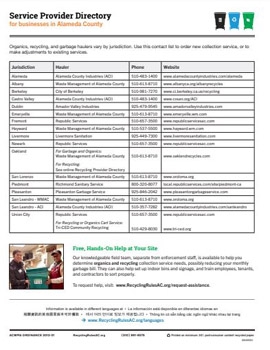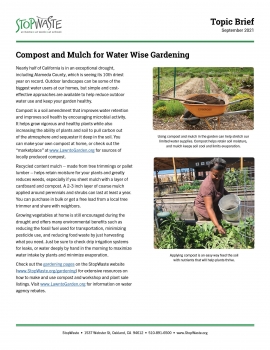Resource Library

A new California State law, SB 1383, aims to keep food and other compostable materials ("organics") out of landfills to reduce emissions that contribute to climate change. Organics, recycling, and garbage haulers vary by jurisdiction. Use this contact list to order new collection service, or to make adjustments to existing services.
Read MoreLearn how to sort materials properly. Although this video describes the Mandatory Composting & Recycling law, it also applies to the new California State law, SB 1383, that will be implemented In Alameda County under the Organics Reduction & Recycling Ordinance (ORRO).
Read MoreAlthough this video describes the Mandatory Composting & Recycling law, it also applies to the new California State law, SB 1383, that will be implemented In Alameda County under the Organics Reduction & Recycling Ordinance (ORRO). To learn more about SB 1383 and ORRO, click here.
Read MoreLearn how to sort materials properly. Although this video describes the Mandatory Composting & Recycling law, it also applies to the new California State law, SB 1383, that will be implemented In Alameda County under the Organics Reduction & Recycling Ordinance (ORRO). To learn more about SB 1383 and ORRO, click here.
Read MoreThis step-by-step video shows businesses how to set up indoor organics and recycling bins.
Read MoreThis step-by-step video shows businesses how to set up indoor organics and recycling bins.
Read MoreThis step-by-step video shows businesses how to set up indoor organics and recycling bins.
Read More- Reports
 Topic BriefsRead More
Topic BriefsRead MoreNearly half of California is in an exceptional drought, including Alameda County, which is seeing its 10th driest year on record. Outdoor landscapes can be some of the biggest water users at our homes, but simple and cost-effective approaches are available to help reduce outdoor water use and keep your garden healthy.